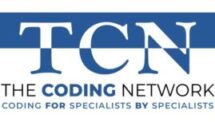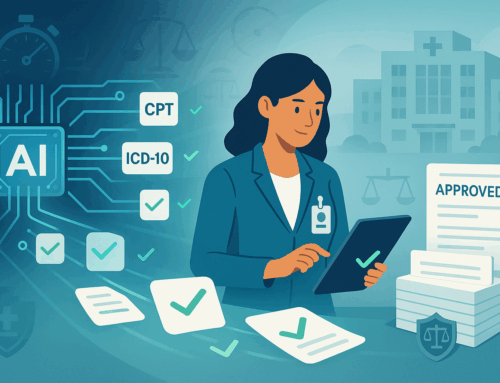Why Conduct a Medical Coding Audit
Medical coding audits ensure accurate clinical documentation, improve revenue cycle management, minimize revenue loss and coding liability, and maintain compliance with industry regulations.
Improved Accuracy of Clinical Documentation
Accurate clinical documentation supports the quality of care delivered to the patients and the providers’ medical coding, which translates diagnoses and procedures into standardized codes used for billing purposes. Audits by coders skilled in a specific medical specialty can identify discrepancies and deficiencies in medical records.
Improving Revenue Cycle Management
- Better cash flow: Accurate medical coding ensures proper reimbursement from payers, leading to improved cash flow.
- Fewer denials: Accurate coding reduces chances for insurance companies denying claims due to insufficient data or improper code assignment.
- Increase efficiency: Coding audits identify areas where staff may need additional training or support, leading to a more efficient billing process.
- Identification of missed billable services: The Correct Coding Initiative identifies many hundreds of services that are “bundled” when done with other services, but many services can be billed separately. An audit by a coding specialist of that clinical specialty can identify services that were inadvertently unbilled.
Maintaining Compliance with Industry Regulations
Coding audits help ensure compliance with industry regulations such as the False Claims Act. The OIG suggests regularly scheduled audits in its model compliance plan to proactively identify compliance issues, and protect providers from potential risks associated with coding errors, inefficiencies, and fraudulent practices.
 Benefits of Medical Coding Audits
Benefits of Medical Coding Audits
Accurate Clinical Documentation
Medical coding audits can identify errors in medical records and billing, preventing potential financial losses and ensuring high-quality patient care.
Provider Education
Training sessions based on audit findings keep providers up-to-date with the dynamic industry standards and best practices for medical coding.
Efficient Healthcare System
- Quicker claims processing: Accurate and complete clinical documentation supports precision coding, leading to faster reimbursements for healthcare organizations.
- Reduced fraud and abuse exposure: Regular audits help identify and address coding errors that lead to fraudulent billing, thereby protecting providers from legal repercussions and financial penalties.
Medical coding audits play a vital role in maintaining the integrity of an organization’s clinical documentation while ensuring compliance with industry regulations. To learn more about how your organization can benefit from medical coding audits, contact The Coding Network today.
Internal vs. External Coding Audits
An internal audit is conducted by an organization’s own personnel, while external audits are done by outside specialized experts.
Overview of Internal Coding Audit Processes
Internal audits detect errors in provider documentation, evaluate adherence to coding guidelines, and promote continuous improvement within the organization. Unfortunately, internal audits are limited by what the providers or coders know. What they don’t know can create the most exposure to costly penalties or the risk of not billing for separately billable services. There are hundreds of updates to the CPT and IDC-10 coding systems each year and the risk of using outdated coding knowledge can be costly in multiple ways.
Importance of External Expert Reviews
There are nearly 20,000 procedure codes and almost 100 modifiers that can be used to help explain them (and change the procedure codes’ reimbursement values.) External specialty-specific coding audits provide an independent assessment, unbiased feedback, and a guide to actionable remediation of coding errors. This is why the OIG’s model compliance plan suggests regular outside coding reviews. A regular outside audit is an inexpensive way to improve revenue cycle management and ensure compliance with governmental regulations and standards. ,
How Often Should You Have a Medical Coding Audit Conducted?
 Regular medical coding audits are crucial for maintaining compliance and avoiding risks associated with errors in provider documentation, inefficient payer reimbursement, and fraudulent billing practices. These coding audits should be conducted at least once annually. Depending on the audit findings, you may be required to conduct re-audits (per DOJ guidance) to prove the coding accuracy is compliant with the CMS / OIG accuracy standard.
Regular medical coding audits are crucial for maintaining compliance and avoiding risks associated with errors in provider documentation, inefficient payer reimbursement, and fraudulent billing practices. These coding audits should be conducted at least once annually. Depending on the audit findings, you may be required to conduct re-audits (per DOJ guidance) to prove the coding accuracy is compliant with the CMS / OIG accuracy standard.
Factors Influencing Audit Frequency
- New Regulations: Stay compliant by reviewing your medical coding processes when new industry regulations are introduced or existing ones change.
- Growth & Expansion: As healthcare organizations grow and add new clinical specialties or new providers who do their own coding, or new coders, conducting “onboarding” coding audits becomes increasingly important to reduce compliance exposure, especially when treating Medicare, Medicaid, Workers’ Compensation, and privately insured patients.
- Payer Audits & Denials: Internal auditing is indicated if your practice experiences an increase in payer audits or denials..
- Benchmarking Performance: Compare your practice’s performance from year to year to assure compliance with all current rules and regulations.
By staying informed and conducting regular coding audits, medical practices can ensure compliance and optimize revenue cycle management.
The Coding Network: Your Solution for Accurate Specialty Coding and Improved Medical Records
Partnering with The Coding Network, LLC means access to comprehensive specialty-specific services designed for healthcare organizations, including hospitals, clinics, revenue cycle managers, medical coding managers, and auditors. With The Coding Network, all coders and auditors are single specialty experts to ensure maximum coding accuracy and coding audit content.
Comprehensive Auditing Services
- Specialty-specific medical coding audits: Ensure accurate and compliant clinical documentation and claims information for each clinical specialty.
- Risk adjustment HCC validation audits: Assess the accuracy of HCC codes assigned based on patient diagnoses to optimize Medicare Advantage reimbursements.
- E&M and procedural selection audits: Review E&M code assignments for appropriate billing levels according to established guidelines. Use the proper surgical and procedural codes within the E&M setting without unbundling.
- Capture missed revenue: Outside audits can identify services that were provided and documented but not coded for billing.
Ensuring Compliance with Guidelines
The Coding Network provides ongoing support through education and training programs aimed at improving staff knowledge in areas such as ICD-10-CM/PCS, CPT coding systems, and regulatory updates impacting medical coding practices.
Partnering with The Coding Network ensures a comprehensive and specialty-specific approach to medical coding audits that identifies areas of improvement and provides the necessary resources and support to address these issues effectively.
Don’t let errors or inefficiencies in your medical coding processes hinder the success of your healthcare organization. Reach out to The Coding Network today to optimize your revenue cycle performance while ensuring adherence to industry regulations.
Maximizing Insights from Audit Data
Audit Follow-Up
Audit follow-up is essential. The specific remedial actions for each coder must be documented, and importantly, following that remediation, there must be a subsequent audit to document that the coding errors have been corrected. Without follow-up audits, there is no proof demonstrating that the remediation has been successful, or that the coder has not fallen back into his/her previous pattern of non-compliant coding.
Importantly, a practice’s lack of follow-up on audit findings has been considered by investigators to be condoning noncompliance.
FAQ about Medical Coding Audits
How often should medical coders be audited?
Coding audits should be performed at least annually, but frequency depends on various risk factors and transitions impacting an organization. For example, if a coder works for doctors in various clinical specialties, then separate samples should be audited for each specialty. Also, surgeons provide both E&M services as well as perform surgical operations; samples of both need to be audited.







